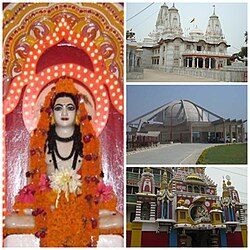Gorakhpur
|
Gorakhpur गोरखपुर گورکھپور |
|
|---|---|

Gorakhnath Math, Taramandal, Geeta Press
|
|
| Coordinates: 26°45′32″N 83°22′11″E / 26.7588°N 83.3697°ECoordinates: 26°45′32″N 83°22′11″E / 26.7588°N 83.3697°E | |
| Country | India |
| State | Uttar Pradesh |
| District | Gorakhpur |
| Government | |
| • Gorakhpur (Lok Sabha Constituency) | Yogi Adityanath (BJP) |
| Area | |
| • Metropolitan | 5,484 km2 (2,117 sq mi) |
| Elevation | 84 m (276 ft) |
| Population (2011) | |
| • Total | 673,446 |
| Languages | |
| • Official | Hindi |
| Time zone | IST (UTC+5:30) |
| PIN | 2730xx |
| Telephone code | +91-551 |
| Vehicle registration | UP 53 |
| Sex ratio | 1000/944 ♂/♀ |
| Avg. annual temperature | 26 °C (79 °F) |
| Avg. summer temperature | 40 °C (104 °F) |
| Avg. winter temperature | 18 °C (64 °F) |
| Website | gorakhpur |
Gorakhpur is a city located along the banks of Rapti river in the north-eastern parts of the Indian state of Uttar Pradesh. It is located near the Nepal border, 273 kilometres east of the state capital Lucknow. It is the administrative headquarter of Gorakhpur District and Gorakhpur Division. The city is home to the Gorakshanath Temple (Gorakhnath Math).
The name "Gorakhpur" comes from the Sanskrit Gorakshapuram, which means abode of Gorakshanath, a renowned ascetic who was a prominent saint of the Nath Sampradaya.
Gorakhpur is one of the most flood-prone districts in Eastern Uttar Pradesh. Data over the past 100 years show a considerable increase in the intensity and frequency of floods, with extreme events occurring every three to four years. Roughly 20% of the population is affected by floods, which are an annual occurrence in some areas, causing huge loss of life, health and livelihoods for the poor inhabitants, as well as damage to public and private property.
Research from the Climate and Development Knowledge shows that measures are in place to mitigate disaster risk in the form of the Gorakhpur District Disaster Management Plan. However, this plan focuses on how agencies can co-ordinate following floods and lacks a systematic approach to identifying weather-related hazards and vulnerability.
The Köppen Climate Classification subtype for this climate is "Cfa" (Humid Subtropical Climate).
Gorakhpur is well connected to through rail network and Gorakhpur railway station one of the important stations in the area as it serves as the headquarters of North Eastern zone of the Indian Railways.
The station offers Class A railway station facilities. On 6 October 2013, Gorakhpur became the world's Longest Railway platform, after inauguration of the remodelled Gorakhpur Yard, with a stretch of around 1.35 kilometres (0.84 mi).
...
Wikipedia

